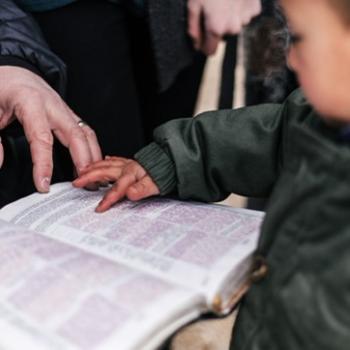There’s been a lot of debate on the topic of attacks lately. Much of that discussion centers on how we can preemptively stop attacks before they even happen. It would seem, in the eyes of many, that the one who does the most preemptively to solve the problem is the one who does the most good. Well, I can certainly think of one area where that is certainly true.
Consider the person and work of Jesus Christ, the object Christians should be re-shifting their focus toward during this Lenten season anyway. Consider in particular the actions He took toward purchasing our redemption from sin and death. To examine this closely is to understand that this total and utter destruction of sin and death forever was indeed a preemptive attack:
Planning the Attack
Why do so many New Testament epistle, Pauline or otherwise, use terms like “beforehand” or “before the foundation of the world” to discuss the eternal plan of adoption, salvation, etc. in the first chapter of their texts?
“…you were ransomed from the futile ways inherited from your forefathers, not with perishable things such as silver or gold, but with the precious blood of Christ, like that of a lamb without blemish or spot. He was foreknown BEFORE the foundation of the world but was made manifest in the last times for the sake of YOU who through Him are believers in God, who raised him from the dead and gave him glory, so that your faith and hope are in God.” (1 Peter 1:18-21, ESV)
”Therefore do not be ashamed of the testimony about our Lord…. who saved us and called us to a holy calling, not because of our works but because of his own purpose and grace, which he gave us in Christ Jesus before the ages began” (1 Timothy 1:8-9, ESV)
”…even as he chose us in him before the foundation of the world, that we should be holy and blameless before him. In love he predestined us for adoption to himself as sons through Jesus Christ, according to the purpose of his will,” (Ephesians 1:4-5)
Could it be that these verses place, as a matter of foremost importance (since their authors mention them in the beginning of their letters), the work of salvation, on the part of Christ, as work that was preemptively strategized for our benefit? If so, how would that play out down here on Earth.
Seeds of Victory
One of the most beautiful things about reformed theology, particularly as it applies to the redemptive work of Christ on the cross, is there is absolutely nothing we can do to muck it up. The gun of sin and death only has one bullet, and Jesus took it, square in the heart. This is where the doctrine of Perseverance of the Saints is such a comfort. For, as John MacArthur famously quipped, “If you could lose your salvation…. you would”. Jesus said twice (in John 10:28-29) that no one can pluck believers out of His hand, and by “no one”, that includes you. Even you can’t mess up your own salvation, once you are in Christ by faith.
The work of Christ doesn’t stop there, though. It produces the result of righteousness. Christ’s preemptive attack is carried through not only to the point of your salvation, but further to the point of your sanctification:
Christ has made “known to us the mystery of his will, according to his purpose, which he set forth in Christ as a plan for the fullness of time, to unite all things in him, things in heaven and things on earth. In him we have obtained an inheritance, having been predestined according to the purpose of him who works all things according to the counsel of his will,” (Ephesians 1:9-11, ESV)
“For we [the Church] are his workmanship, created in Christ Jesus for good works, which God prepared beforehand, that we should walk in them. “ (Ephesians 2:10, ESV)
Even the good works that we do for Christ, as His cross-redeemed, covenant people, are themselves part of the preemptive plan from before the beginning of the world.
The Plan in Motion
To look at the crux of this preemptive plan, we must go the crux: the cross of Jesus Christ. The plan is simple: Provide a way for the sins of believers to be forgiven. Luke’s gospel reveals to us a vital insight about the forgiveness OF the cross, pronounced by Jesus while ON the cross.
Before we look at Luke’s crucifixion account, though, let us first consider two insights from Matthew on temptation and trial:
-When Jesus faced temptation, He went on the offensive. Satan comes to tempt Him (Matt. 4:1-11) and He goes on the attack with the only offensive (non-defensive) weapon in the armor of God, namely the word of God. He quotes scriptures from Deuteronomy 6 and 8, verses particularly focused on temple worship; how to have a proper relationship with God.
-When Jesus then went on to preach the most famous sermon of all time, The Sermon on the Mount, He closes the famous preamble (the “Beatitudes”) with this little nugget on temptation: “Blessed are ye, when men shall revile you, and persecute you, and shall say all manner of evil against you falsely, for my sake. Rejoice, and be exceeding glad: for great is your reward in heaven: for so persecuted they the prophets which were before you.”. When it comes to the issue of temptation, He goes on the offensive, but when (a few verses later) He speaks of trials, He goes on the defensive. He flips the script and points out that trials for the sake of Christ, are actually GOOD things… things to rejoice about. His brother James poignantly teaches us a similar exhortation: Consider it pure joy, my brothers and sisters, whenever you face trials of many kinds, because you know that the testing of your faith produces perseverance. (James 1:2-3). So, for temptations… attack! For trials… defend.
How appropriate, then, that, in the preemptive work of the cross, Jesus does BOTH. He resisted the greatest temptation the world has ever known (“come down from that cross”…. “He saves others but He cannot save Himself”)… and He did so in order that He might face the greatest trial of all time, namely the pouring out of all the unquenchable wrath of God of your sins and mine. This was a trial so great that even the thought of it made Him so nervous that He sweat blood (Luke 22:44)… and as He went to face that trial, we must see the nature of forgiveness that He therein bestowed:
“When they came to the place called the Skull, they crucified him there, along with the criminals—one on his right, the other on his left. Jesus said, ‘Father, forgive them, for they do not know what they are doing’.” (Luke 23:33-34, ESV)
Question: Who is Jesus forgiving here? Sequence in scripture is very important. Short of the nails in His hands, no one has done anything to Him yet. Jesus is announcing forgiveness preemptively upon those who, in the verses to come, will mock Him (the very God Whom Paul says “is not mocked”):
And they divided up his clothes by casting lots. The people stood watching, and the rulers even sneered at him. They said, ‘He saved others; let him save himself if he is God’s Messiah, the Chosen One.’ The soldiers also came up and mocked him. They offered him wine vinegar37 and said, ‘If you are the king of the Jews, save yourself.’ There was a written notice above him, which read: this is the king of the jews. One of the criminals who hung there hurled insults at him: ‘Aren’t you the Messiah? Save yourself and us!’ ” (Luke 23:33-39, ESV)
Jesus pronounces forgiveness from the cross on those who haven’t even sinned against Him yet. He certainly knew what they were going to say. “Even before a word is on my tongue, behold, O LORD, You know it all” (Psalm 139:4, NASB) He knew what they were going to say (or do) and forgave them in advance. This preemptive forgiveness speaks right into the heart of Paul’s gospel presentation in Romans. What does the Apostle write about the preemptive salvation process of that cross?
“But God demonstrates his own love for us in this: While we were still sinners, Christ died for us.” (Romans 5:8, NIV).
So what do we make of this? Do you remember asking someone for forgiveness, only to have them reply to you with something akin to “already forgiven” or “there’s nothing to forgive”? Well, in a sense, this is what Christ is telling you in the gospel, if you believe it by faith this day. In the season of Lent, confession takes a prominent role. We’re reminded of all “the sins that so easily entangled” us this past year. What a comforting and unrelenting relief it is, then, for believers to understand that their sins were forgiven on that cross, long before they were ever committed. Christ could offer assurance of Heaven to the other thief beside Him because the final word on the matter was “It is finished”. That includes the finished work of the forgiveness of your sin. God’s plan to call you… to forgive you… to save you… to adopt you… was already well in motion before this world even came to be. That’s why you can rest in confidence that our sins are “as far as the East is from the West”… because, if you’re in Christ, that’s exactly where they’ve been all along.













